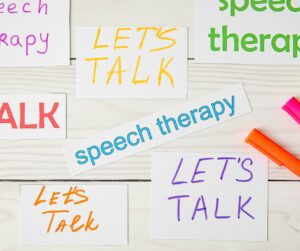Speech therapy assesses and treats speech disorders and communication problems. It helps people develop skills like comprehension, clarity, voice, fluency and sound production. Speech therapy can treat childhood speech disorders or adult speech impairments caused by stroke, brain injury or other conditions.
What is speech therapy?
Speech therapy is treatment that helps improve your speech and language skills. It helps with early language skills, voice and sound production, comprehension, fluency, clarity and expression.
What does a speech therapist do?
A speech therapist — also called a speech-language pathologist — assesses, diagnoses and treats speech disorders and communication problems. They treat children with developmental delays, as well as adults with speech impairments caused by injury or illness. Your healthcare provider may refer you to a speech-language pathologist for a variety of reasons.
Who needs speech therapy?
Speech therapy is beneficial for children and adults with communication disorders. It can also help people with hearing impairments or those who have difficulty swallowing. Your healthcare provider may recommend speech therapy to help with:
- Aphasia. People with aphasia can have difficulty reading, writing, speaking and understanding language. The condition can develop when areas of your brain that process language are damaged by stroke or injury.
- Apraxia. People with apraxia know what they want to say, but have trouble forming the words. They may have trouble with reading, writing, swallowing or other motor skills.
- Articulation disorders. Children with articulation disorders are unable to produce certain word sounds. For example, they may substitute one sound for another — like saying “wed” instead of “red” or “thith” instead of “this.” Early intervention speech therapy can help with articulation disorders.
- Cognitive-communication disorders. When the area of your brain that controls your thinking ability is damaged, it can result in difficulty communicating. People with cognitive-communication disorders may have issues with listening, speaking, memory and problem-solving.
- Dysarthria. Sometimes, the muscles that control your speech become weak due to stroke, multiple sclerosis (MS), amyotrophic lateral sclerosis (ALS) or other nervous system disorders. People with dysarthria may have slow or slurred speech.
- Expressive disorders. People with expressive disorders may have difficulty getting words out or conveying their thoughts. Expressive disorders are linked to stroke or other neurological events, developmental delays or hearing loss.
- Fluency disorders. Fluency disorders disrupt the speed, flow and rhythm of speech. Stuttering (speech that’s interrupted or blocked) is a fluency disorder. So is cluttering (speech that’s merged together and fast).
- Receptive disorders. People with receptive disorders have difficulty comprehending or processing what others are saying. As a result, they may have a limited vocabulary, trouble following directions or they may seem uninterested in conversation.
- Resonance disorders. Conditions affecting your oral or nasal cavities may block airflow and alter the vibrations responsible for sound. Resonance disorders are linked to cleft palate, swollen tonsils and other conditions that affect the structure of these body parts.
PROCEDURE DETAILS
How do I know if speech therapy is necessary?
If your healthcare provider suspects that you or your child has a speech disorder, they’ll recommend some initial screenings. These tests will help determine the underlying cause. For example, if your child has trouble communicating, your healthcare provider will find out if it’s due to a speech disorder or a hearing problem. If your child passes the hearing test, then your healthcare provider will likely refer them to a speech-language pathologist.
What happens during speech therapy?
What happens during speech therapy depends on several factors, including your age and type of speech disorder you have. For children, it usually involves play, such as sequencing activities or language-based board games. For adults, it’s focused on improving or rebuilding particular skill sets.
Your speech-language pathologist will recommend appropriate treatment based on your unique situation. There are many different approaches and categories of speech therapy, and your healthcare provider will find one that works best for you.
What are some speech therapy techniques?
There are a number of speech therapy techniques that your speech-language pathologist may use to treat your condition. Treatment varies significantly for each person, depending on the type of speech disorder they have. Your speech pathologist will develop a detailed plan of care specific to you or your loved one’s needs.
What are some speech therapy techniques I can try at home?
Kids and adults alike can practice speech therapy techniques at home. Your healthcare provider can recommend exercises for your specific condition. Some general techniques for children and adults include:
Speech therapy techniques for children
Activities to try with your child at home:
- Read to your child. Reading to your child is a wonderful way of developing their speech and language skills. If they’re old enough to read, let them read back to you. If they’re too young to read the words, let them explain what they see in the pictures. Have your child point to the pictures that you name for them, or have them name pictures you point to.
- Reduce screen time. Research shows that watching too much television can delay language development. The best way to teach your child proper speech is by modeling speech and language to them directly.
- Be attentive and patient. If your child has a speech disorder, it’s important to be patient. Don’t push them to get the words out. This may cause additional anxiety, which can make the problem worse. Say to your child, “Take your time, I’m listening.” Then give your undivided attention while they communicate with you.
- Play games with your child. Board games that include guessing objects, describing objects or asking questions are a wonderful way to expand language skills.
- Be a good speech model. Use simple but grammatically correct speech that’s easy for your child to imitate. Talk to them about what you’re doing. Label shapes, colors, clothing items and body parts.
Speech therapy techniques for adults
Adults with speech disorders can also benefit from at-home exercises. You can try:
- Tongue exercises. Stick your tongue out, hold for two seconds, then bring it back in. Repeat this process several times. You can also try this same exercise, but move your tongue to each corner of your mouth for two seconds. Finally, move your tongue up and down in the same fashion. These exercises help train your tongue to move in coordinated patterns.
- Smiling. Simply smiling in front of a mirror can help improve motor skills. Smile. Relax. Smile again. Repeat this process several times.
- Puckering your lips. Try puckering your lips, then relaxing. Repeat this several times. This can help you control the movement of your mouth.
- Reading out loud. If your speech disorder prevents you from moving your mouth and tongue properly, reading out loud can be excellent practice. Start out with a few small sentences and work your way up from there.
- Playing word games. Studies have shown that memory games, word searches and crossword puzzles can help maintain cognitive function and improve thinking skills.
RISKS / BENEFITS
Does speech therapy actually work?
Yes. Millions of people have improved their language and communication skills with speech therapy. Keep in mind that success rates vary for each individual. For children, speech therapy is most successful when started early and practiced at home with a parent or caregiver.
What are the advantages of speech therapy?
Speech therapy offers a number of benefits, including:
- Improved self-esteem.
- Increased independence.
- Improved ability to comprehend and express ideas, thoughts and feelings.
- School readiness for young children.
- Enhanced vocal quality.
- Early language skills.
- Better swallowing function.
- Improved quality of life.
RECOVERY AND OUTLOOK
How long do you need speech therapy?
The answer to this question is different for everyone. It depends on several factors, including:
- Age.
- Type of speech disorder.
- Severity of the speech disorder.
- Underlying medical condition.
- Frequency of speech therapy.
Some speech disorders improve with age, while others may require long-term speech therapy. If a medical condition has caused your speech disorder, then your speech and language skills may improve as you recover from the underlying issue.
WHEN TO CALL THE DOCTOR
When should I see my healthcare provider?
If you have a medical condition that’s resulted in a speech disorder, your healthcare provider will let you know when it’s time to see a speech-language pathologist. If you suspect your child has difficulties with language or comprehension, call your healthcare provider to schedule an appointment. Common warning signs include infrequent talking, trouble using language socially and difficulty understanding simple sentences.
A note
Overcoming a speech disorder can take time, effort and practice. But patience and understanding go a long way. If you or your child has difficulty communicating, ask your healthcare provider about scheduling a screening with a speech-language pathologist. Speech therapy is a wonderful resource that can give you or your child more independence, confidence and a better quality of life.
Source: clevelandclinic.org/


